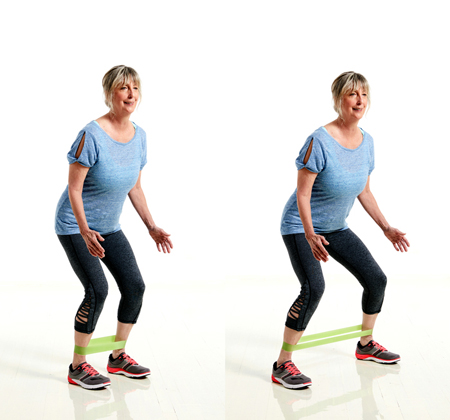You can condition the knee. Physical therapist are doing just that when they rehab knees. And before you say that all of the things below are about muscle exercises. Keep in mind that the muscles to not work independently of tendons and ligaments.
"The
Arthritis Foundation state that exercise may be the most effective way to treat osteoarthritis without surgery, while the
American Academy of Orthopaedic Surgeons note that strong and flexible muscles can keep knees healthy and prevent injury.
Knee strengthening exercises do not affect the knee joint directly, but they strengthen the muscles surrounding it. Strong muscles in the legs can help provide support for the knees. This support may alleviate pressure and strain on these joints, which can relieve pain and help a person be more active."
Source:
Knee strengthening exercises: 6 types and what to avoid
8 Exercises to Help Your Knees
"Source:
Slideshow: Knee Exercises to Help Prevent Injury
Tai chi can also help your muscle strength and balance, says Leigh F. Callahan, PhD, a professor of medicine at the University of North Carolina, Chapel Hill.
She led a study based on a tai chi program run by the
Arthritis Foundation. The results: People in the 8-week course improved their ability to balance, and reported less pain,
fatigue, and stiffness.
Other research, published in the
New England Journal of Medicine, has found that tai chi can be helpful for people who have
fibromyalgia, a condition that causes widespread pain (which may include but is not limited to the joints). It's also been shown to aid people with chronic low
back pain, as well as those with
ankylosing spondylitis, an inflammatory disease of
the spine.
Source:
Tai Chi for Joint Health
The Strength Exercises Your Knees Need
It turns out, to fix your knees, you have to think outside your knees. People with bad knees should aim to strengthen their hips, Ebner says. Doing so will provide better support for the knees. He recommends the following hip-strengthening exercises.
1. Resistance-Band Side Step
Loop a resistance band either above your knees (least resistance), below your knees (medium resistance), or around your ankles (greatest resistance). Bend knees slightly with your feet hip-width apart.
Step to the side until the band provides resistance, then slide your other foot over to re-create your original stance. Repeat this sidestepping movement for 10 to 15 feet in one direction (or as far as you can), and then cover the same distance in the other direction. Source:
The Best and Worst Exercises for Your Knees
Is Squatting Bad for Your Knees?
The short answer: No, especially with proper conditioning of the knees.
Source:
Exercises & Solutions for Crunchy, Painful Knees
Knee Conditioning Program
Bow stance:
View attachment 22998
Horse Stance
View attachment 22999
Source
Knee Conditioning Program - OrthoInfo - AAOS

